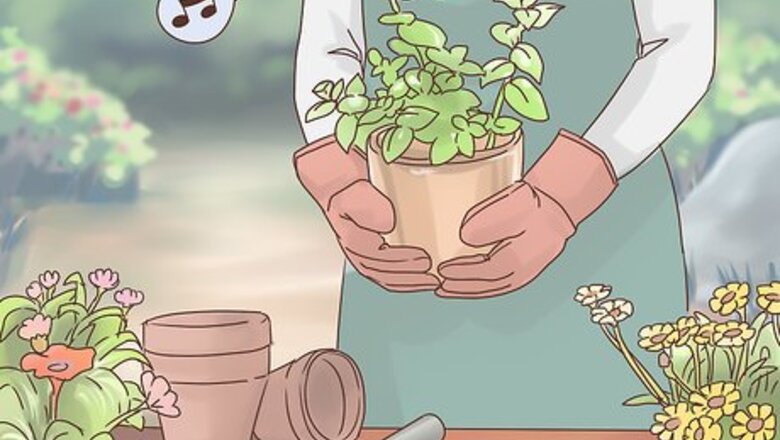
views
Choosing Productive and Positive Distractions
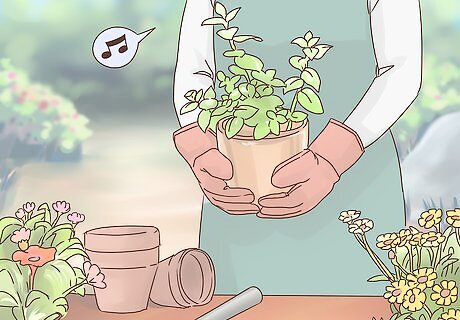
Choose engaging distractions. The point of using distraction as a coping skill for bipolar disorder is that interrupts a cycle of negative thoughts and behaviors by shifting your attention somewhere else. If your alternative activity isn't something you enjoy, you likely won't fully engage in it, and will likely still be caught in your cycle. Choose distractions that you really enjoy or that will require your full attention. For example, if you enjoy gardening, then try using pruning your roses as a distraction when you're feeling irritated. Or, as another example, you might take a break from practicing your guitar for the recital when you notice you're getting frustrated and do some of your homework as a distraction.
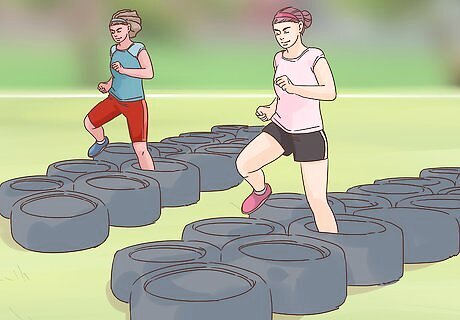
Do something active. This can be a great way to distract yourself for a lot of reasons. Being active can help you reduce stress and tension, manage your bipolar disorder, and help boost your overall health. It's also an activity that you can fully immerse yourself in. Try taking a walk or doing some stretches for a quick distraction that can also help energize you and release tension. Try participating in a team or partner sport like tennis, basketball, football, or lacrosse. This can help you distract yourself, be fit, and socialize a bit.
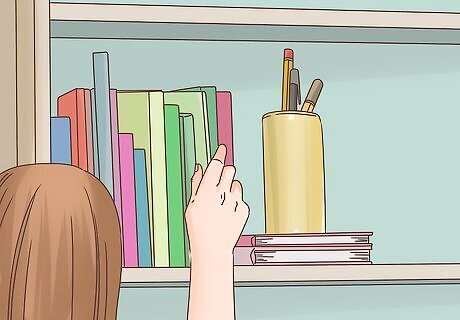
Get organized. You can be productive while distracting yourself if you use the time to organize your schedule and your physical space. Getting organized can not only be a way to focus your attention on something less stressful, it can also be a good way to manage your bipolar in general. Make sure that you have your treatment information organized and easily accessible. For example, you might create a notebook containing emergency treatment information. Organize your workspace so that you only have materials that you need there. Use trays, cups, baskets, etc. to help you find a home for everything.
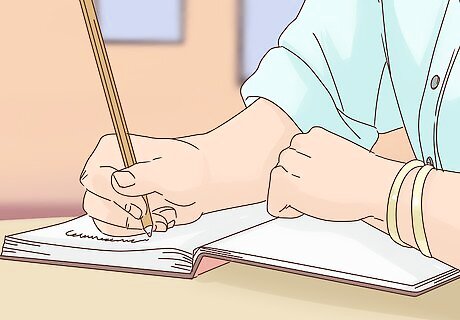
Try journaling. Keeping a journal can help you in several ways. It can serve as a way to release your feelings and thoughts, keep track of important information like your triggers and signs, and document how well your treatment and coping strategies are working. Writing in your journal can also be a really good way to distract yourself. Writing about your day may help you identify personal triggers and signs that you may need to distract yourself. Instead of focusing on what has you upset, try focusing on writing about how you are feeling, why you might feel this way, and what you can do about it.
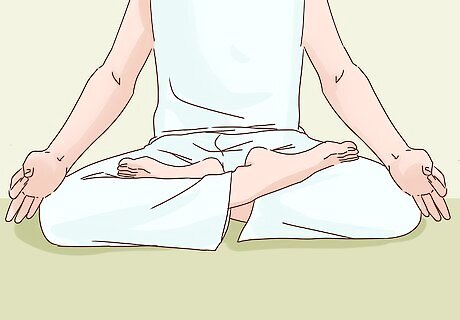
Practice meditation. This can be another positive and productive way to distract yourself. Meditation can help relieve physical tension, clear your mind, and calm and relax you. It's also something that you can do no matter where you are, for as long or as short a time as you need. Make yourself as comfortable as possible. If you can, go somewhere quiet where you can sit or lie without being disturbed. Focus on your breathing. Think about it as you slowly inhale through your nose, hold it in your belly, and then release it through your mouth. Try not to think about anything but your breathing. If your mind wanders, gently bring your thoughts back to your breathing.
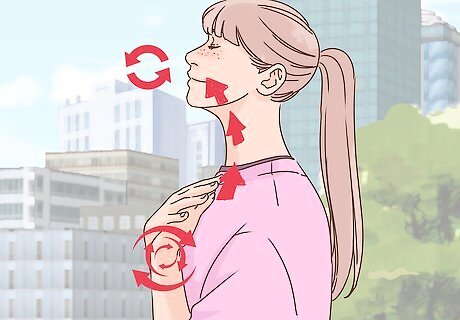
Choose safe distractions. Using alcohol and drugs to distract yourself from your present situation is unhealthy, but there are other things you can do instead. In some cases, you will need to distract yourself but also remain focused on what you're doing. For example, if you're driving and find yourself getting stressed because of traffic, meditating isn't the best distraction. When this happens, you can still use distraction as a coping skill, you just need to do something that won't make the situation dangerous for you. Try deep-breathing exercises. You can do this anytime and anywhere. For instance, you can distract yourself from stand-still traffic by focusing on your breathing like you do during mediation. Recite a mantra. Memorize some encouraging words or even a poem or prayer that you can silently recite to yourself as a form of distraction. Focus on relaxing one part of your body at a time. For example, if you're in a meeting and feel tense, you can try to distract yourself by thinking, “I'm relaxing my toes” as you wiggle and flex your toes. Do this with each body part or until you are calmer.
Recognizing When You Need to Distract Yourself
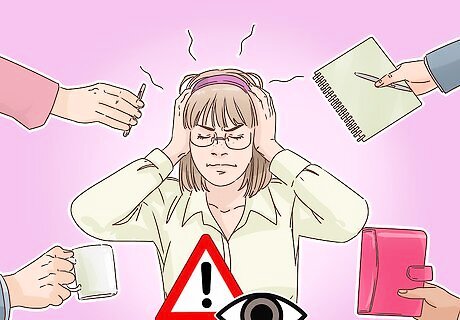
Recognize signs of stress. The signs you're looking for are behaviors, thoughts, or emotions that may indicate you're experiencing a lot of stress or that a bipolar episode may be coming. The sooner you are aware of the possible signs of high stress or a bipolar episode, the sooner you can begin distracting yourself so that you can try to cope with what's going on. Some of the signs that you may be under a lot of stress are physical tension, fatigue, irritability, and trouble focusing. Some possible signs of a bipolar episode include mood swings, agitation, withdrawing from people and activities, and problems sleeping. Determine what your specific signs are. Writing in your journal can be helpful for this. When you write how you're feeling, try looking back at older entries to see if you can identify any patterns that might indicate potential signs of stress or a bipolar episode for you.
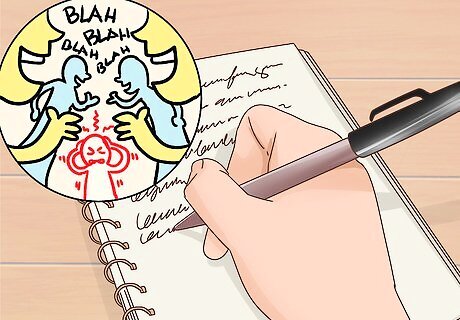
Know your triggers. Triggers are people, places, events, or situations that can increase the chances you will become stressed or have a bipolar episode. For example, starting a new job or visiting your childhood home may cause you a lot of stress. If you know what your triggers are, you'll be able to anticipate when you might need to use a self-calming technique like distraction. Make note of what things seem to upset you if you don't already know what your triggers are. For example, you might write it in your journal if you noticed that you got agitated while at a Black Friday sale. Look back through your journal and make a list of your typical triggers. For instance, you might have written down: loud crowds, moving, and taking written tests.
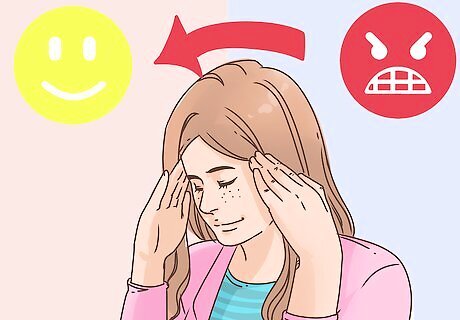
Be mindful of your moods. Before you can use distraction as a coping skill for bipolar disorder, it's important to recognize moments when you need to calm and distract yourself. Being mindful can be a great way to stay aware of your moods and feelings in the moment as well as how they are changing. Focus on doing only one thing at a time. This way, your mind won't be scattered all over the place and you'll be more likely to recognize when you need to distract yourself sooner. Pay attention to all of your senses. For instance, when you're doing yoga, pay attention to how your muscles feel, the sound of the instructor's voice, and the smell of the incense. Be mindful of your emotions and how they change. For example, you might think, “I was calm until I thought about my report. Now I'm feeling tense and overwhelmed.”
Using Distraction as Part of a Larger Treatment Plan
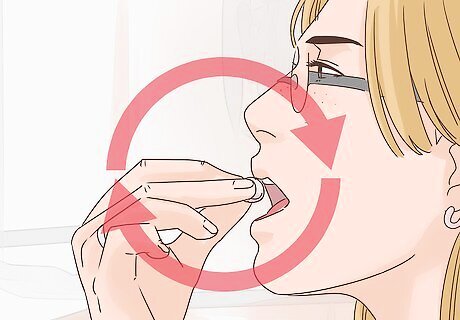
Continue taking your medication. While using distraction as coping mechanism for bipolar disorder can be useful as an occasional and temporary solution, it doesn't replace sticking to an effective treatment plan. Continue participating in your treatment and doing things like taking your medication to ensure that you are managing your bipolar disorder as well as possible. Make a note of how often you need to use distraction when you are taking your medication. Use these notes to help evaluate how well your medication is working. For example, if you notice that you've needed to distract yourself more frequently lately, it may be a sign that your medication needs to be adjusted. Talk to your mental health provider if you feel your medication isn't working. You might say, “I've had to distract myself a lot more over the past month. I think we might need to adjust my medication.”
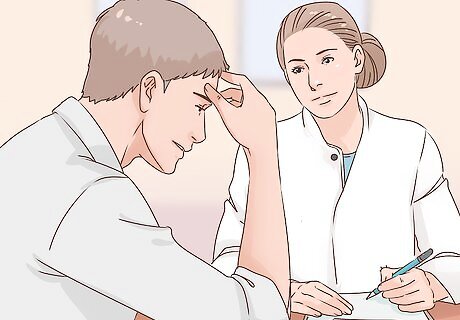
Talk with your therapist. A professional can help you use distraction as coping skill for your bipolar disorder in several ways. They can offer specific strategies and techniques for distracting yourself, offer encouragement, and help you manage your bipolar disorder in general. You might say, “Could we talk about some ways that I can use distraction as a coping technique?” Your therapist can also help you monitor how well your distraction strategies are working. You could ask, “Is there a way for us to track how effective I am at distracting myself?”
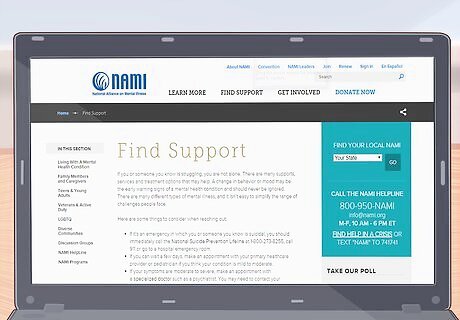
Join a support group. Spending time with other people who have bipolar disorder can help you in a number of different ways. The people in the support group may be able to offer you encouragement and a sense of connectedness. Joining a support group can also help because the other members may be able to suggest ways that you can use distraction as a coping skill. The National Alliance of Mental Illness (NAMI) provides information about support groups at https://www.nami.org/Find-Support. The Depression and Bipolar Support Alliance(DBSA) also provides a support group directory on their webpage http://www.dbsalliance.org/site/PageServer?pagename=peer_support_group_locator. Ask your mental health provider about support groups in your area. You could say, “I'd like to join a support group. Could you recommend some in the area?” You can also join an online support group or online forum if you can't attend an in-person support group.
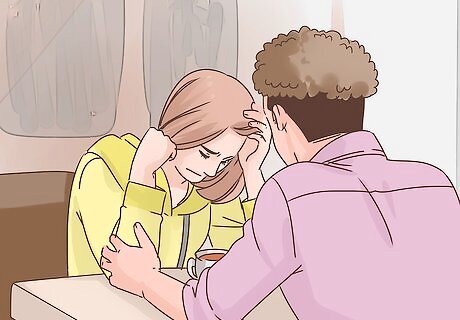
Rely on family and friends. Your loved ones can do a lot to help distract you when needed, as well as help you manage your bipolar disorder in general. Let the people that care about you know that you might need them to distract you from time to time. You might ask someone close to you to distract you if you start showing any signs of stress or a bipolar episode. For example, you might say, “Could you distract me if I get grumpy and super lazy?” Contact family and friends when you need to distract yourself. For instance, calling your best friend can be a great way to distract yourself when you notice you're having negative thoughts. It's okay to ask someone to come just be with you if you're feeling out of sorts. You might say, “Can you come over and just hang with me? I don't want to do anything, but I need a distraction.”




















Comments
0 comment